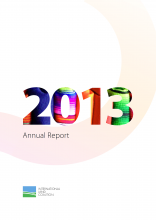Location
The International Land Coalition (ILC) is a coalition of civil society and intergovernmental organizations promoting secure and equitable access to and control over land for poor women and men through advocacy, dialogue and capacity building.
Resources
Displaying 151 - 155 of 261Plotting progress: Integrated planning in the rangelands of Kenya, Ethiopia, and Uganda
Plotting progress: integrated planning in the rangelands of Kenya, Ethiopia, and Uganda
Ill advised, uncoordinated, and badly planned interventions have been blamed for continuing poverty and food insecurity in rangelands. Water interventions in particular have had negative impacts. Not only have these interventions failed to improve the livelihoods of people living there, but in many cases they have served to undermine them and the environment on which they depend. Rangeland development interventions have been sectoral in their approach.
International Land Coalition Annual Report 2013
In 2013, the International Land Coalition (ILC) marked a historic expansion in its membership, reaching 152 member organisations in 56 countries, representing diverse interests and entities from national civil society organisations (CSOs) and grassroots movements to international non-governmental organisations (NGOs) and United Nations agencies, all with a common agenda to work together on behalf of the world’s most vulnerable people to make tangible progress in achieving secure and equitable access to land.
VGGT: Manual on Land Monitoring. How to establish an effective land monitoring initiative
Guide to determine if monitoring is actually a viable activity that can be undertaken by their organisation. Choosing to undertake monitoring is dependent on considerations such as evaluating the sufficiency of resources, capacity to design a sound monitoring system, and availability of political windows to effect change, amongst others.












